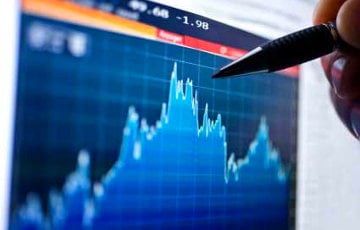The Russian Stock Market Has Fallen To The 'Bottom'
3- 2.09.2024, 13:51
- 7,786

It was the worst August for the Russian market in 25 years.
While the Russian authorities are calling the population to the stock market, it is dramatically declining, writes The Moscow Times.
Its main indicator, the MICEX index by 13.00 Minsk time, lost 2.5% – 2584.4 points. This is a level more than a year ago: the last time the MICEX index fell below 2,600 points in May 2023.
For the month, it lost 10%, dropping from 2,942.68 to 2,650.32 points. This was the worst August for the Russian market in 25 years since 1999, said investment banker Yevgeny Kogan. And the largest monthly drop in the index since September 2022 (when partial mobilization was announced), SberCIB analysts add: "The market is concerned about the growth of geopolitical risks and the possible increase in the key rate in the fall." Taking into account today's fall, the collapse is almost 12%.
August was the fourth month in a row when the market fell. From the May peaks (3,450 points), the decline was almost 25%. This is comparable to the largest collapses in the last 20 years, such as the beginning of the war, the pandemic and the financial crisis of 2008, says Yaroslav Kabakov, director of strategy at Finama. "The market is burning, we're rewriting strategies," says an analyst of a large broker.
The last days of the sale are at a serious turnover, more than 100 billion rubles, which indicates the strength of the trend, said Alexey Antonov, head of the investment consulting department of Alor Broker. The technical picture is negative, agrees Alexey Golovinov, Chief Analyst of Promsvyazbank.
Listing the reasons for the fall, experts highlight high interest rates that hit companies' profits and make shares less attractive compared to deposits, bonds and money market funds, growing sanctions pressure (the latest package of sanctions hit metallurgical and companies and a number of other industries), as well as schemes that sometimes allowed non-residents to get rid of seemingly frozen Russian securities (the Central Bank blocked one of them a week ago). Since the beginning of the year, the shares of one of the favorites of the Russian market, Sberbank, taking into account dividends, brought their owners about 9% of profit, which is comparable to the yield of deposits for six months, analysts from the My Investments recently gave an example.
Russians continue to bring money to the market: according to the Central Bank, in the second quarter, the net inflow of funds to brokerage accounts amounted to 299 billion rubles. A significant part of this money is invested in money market funds, which can earn at high rates and are more promising in the current conditions. As a result, the share of exchange-traded mutual funds in the assets of the population on brokerage accounts reached a record 8%, the share of Russian shares and bonds was 32% each.
The main problem is still the stakes. The further fate of the market will be determined on September 13, when the Central Bank will not only make a decision on the key rate, but also give a more important comment on the inflation situation, Antonov writes, expecting that the stock market will most likely meet on September 13 in the range of 2500-2600 points. "All attention is focused on the meeting of the Central Bank on September 13, a very important event for the stock market. Prices on many securities are already more than attractive,” Kogan writes.
The market is in the stage of searching for the bottom, and analysts believe that it is close, writes Kabakov. Analysts of the "Broker's Number" hope that it is close, and "in the near future, indices will be able to find support, for example, after the meeting of the Central Bank, when uncertainty about the prospects for the key rate disappears." The chief economist of T-Investments, Sofia Donets, believes that tough policy is already embedded in prices, and despite the lack of positive in the markets, economic data does not justify the latest decline in indices: "The market is already noticeably undervalued, which creates an interesting entry point."
“In hindsight, it was wise not to invest in most stocks this year,” My Invest analysts reasoned at the end of August. "However, looking ahead, we can say that Sberbank shares have become again attractive for purchase, taking into account the decline in price and the expected dividend yield of about 15%."











